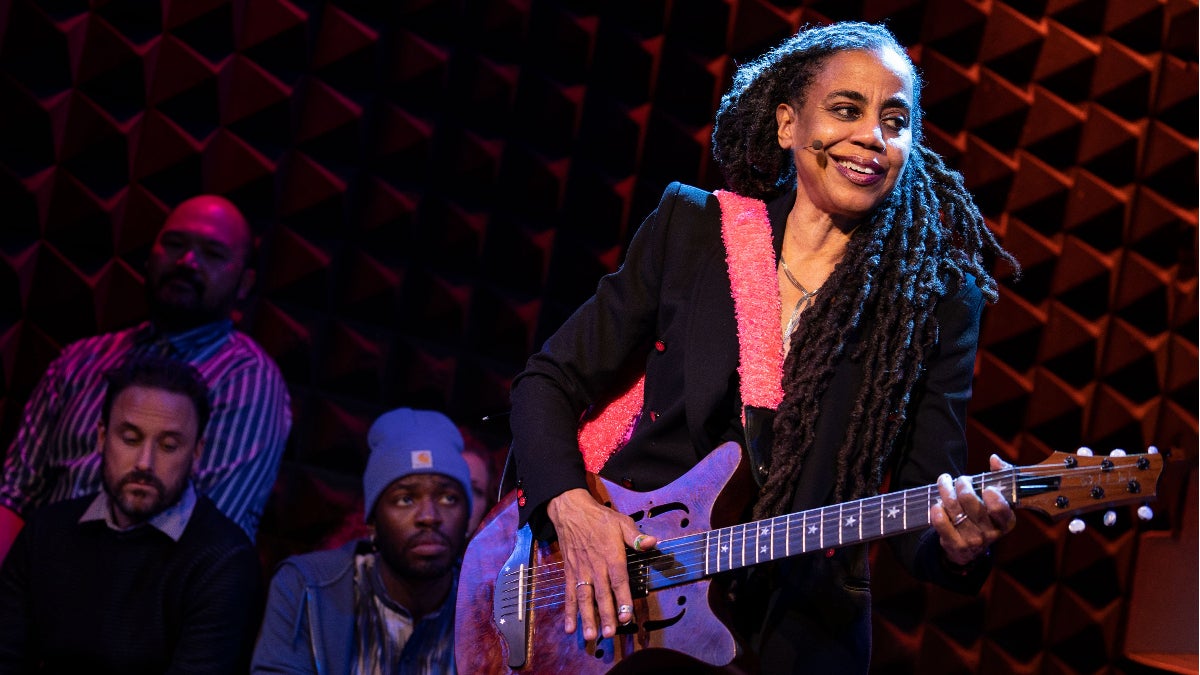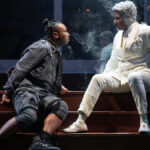
How do you measure a year in the life? The Pulitzer-winning playwright Suzan-Lori Parks takes an approach that’s not dissimilar to “Rent,” using both song and snapshots of topical issues to mark a momentous calendar year of change. And she’s chosen a year — 13 months, technically — that begins in mid-March 2020, just as theaters worldwide shut down and the TV project on which she had been toiling went on hiatus for what was thought at first to be a few weeks. And then turned out to be far longer.
Parks, in lockdown with her German-born husband and 8-year-old son, decided to spend her sudden free time writing. The goal was to produce a short play each day — sometimes a monologue, or a short scene, or even a song. The outgrowth of all that time-passing is “Plays for the Plague Year,” a sprawling revue of the recent past that opened Tuesday at the Public Theater’s Joe’s Pub (a premiere that was scheduled to happen last fall but was postponed when Parks herself caught the bug).
The playlets, with projected title cards, are short. Some clock in less than a minute, and they capture scenes from the early days of the pandemic: the run on toilet paper, the fixation over hand-washing for the duration of the “Happy Birthday” song, the nightly banging of pans at the window to honor doctors and other frontline workers, the adapting to Zoom meetings and remote schooling. There are also snapshots of victims of the pandemic, from a school principal to the musician John Prine.
Early on, the idea of saying safe amid a pandemic broadens to encompass the very real threat posed by racist cops and other authority figures in the waning months of the Trump administration. Ahmaud Arbery, Breonna Taylor, George Floyd were felled by a different kind of virus whose origins were much, much closer to home — and Parks finds ways to bring the impact of those casualties home.
Parks, whose most recent work at the Public was an adaptation of the big-screen reggae musical “The Harder They Come,” for which she also wrote new songs, has also produced an album’s worth of bluesy tunes during her lockdown time, mostly bluesy riffs that (like her spoken-word sketches) seldom offer more than a second verse, let alone a bridge. These are sweet little ditties occasionally marked by poetic lyrics (“our hurricane of love was downgraded to a tropical depression”) that she frequently delivers herself, with a guitar in hand, in an earthy alto that makes up in feeling what it sometimes lacks in range.
But she’s also recruited some vocal ringers in her eight-person cast, who quadruple and quintuple up as multiple characters. Leland Fowler is a standout, with a bright, clear tenor and a chameleon-like ability to shape-shift from an 8-year-old boy to Herman Cain to James Baldwin, sometimes in a matter of seconds. And Danyel Fulton raises the roof with her powerfully soulful voice — and spot-on impression of Little Richard complete with vibrato flourishes.
The show, directed by Niegel Smith, sometimes drags under the weight of a three-hour running time, losing some of its power from a structure that flits from moment to moment like a hyperkinetic MTV recap. Because every episode is so short, including songs that tend to blend together, they all carry an equal narrative weight that isn’t always justified. Still, there are moments of real beauty here, and flashes of insight that you wish Parks had taken the time to flesh out and explore further. (I was particularly intrigued by the COVID-era adjustments to her TV scripts, as a party scene requiring 50 actors morphs into one with just three performers.) In the end, “Plays for the Plague Year” leaves you in a state of contradiction that may feel familiar to all pandemic survivors: wanting more — and a whole lot less.
















